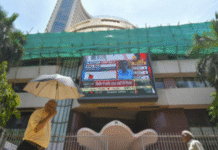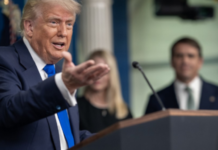Washington–In a major policy shift that could significantly affect Indian tech professionals and U.S.-based tech companies, President Donald Trump has signed a proclamation drastically tightening the H-1B visa program.
Under the new rule, every H-1B visa application—new or renewed—will now carry an annual fee of $100,000, a move the administration says is intended to curb abuse of the program and promote the hiring of American workers.
“We need workers. We need great workers—and this pretty much ensures that,” Trump said at the White House on Friday while signing the proclamation. “The incentive is to hire American workers.”
Commerce Secretary Howard Lutnick, speaking alongside the president, said the policy aims to make it economically impractical for companies to rely on foreign labor.
“The whole idea is, no more training foreign workers at the expense of American talent. Companies will have to pay the government $100,000, then pay the employee on top of that—it’s just not sustainable,” Lutnick said.
“Train a graduate from one of the great universities across our land. Stop bringing in people to take our jobs.”
The new policy limits the H-1B visa to a maximum of six years, including renewals, and applies to both new applicants and those seeking extensions.
“Either the person is very valuable to the company and to America, or they’re going to depart,” Lutnick added. “Stop the nonsense of letting people just come into this country on these visas that were being given away for free.”
The proclamation alleges that the H-1B program has been “deliberately exploited to replace, rather than supplement, American workers,” and that it undermines both U.S. economic interests and national security.
Additionally, the order directs the Department of Labor to revise prevailing wage levels, further tightening the cost and eligibility requirements for H-1B workers.
“Tech Companies Are On Board”
Despite the sweeping changes, both Trump and Lutnick claimed the move has the backing of major technology firms.
“They love it. They really love it,” Trump said. “They need it. I think they’re going to be very happy. Everyone’s going to be happy. And we’re going to keep people in our country who will be very productive.”
New “Gold Card” Visa Program
In a parallel move, President Trump also signed an executive order introducing a new “Gold Card” visa program. Under the plan, individuals can obtain U.S. residency by investing $1 million, while corporations can secure similar visas for $2 million.
Impact on Indian Tech Talent
The changes are expected to have a profound impact on Indian professionals, who make up the vast majority of H-1B recipients. According to Pew Research, Indian nationals received about 73% of all H-1B approvals in 2023, followed by China at 12%.
The H-1B program, capped at 85,000 new visas annually, has long been a vital channel for U.S. companies—particularly in the tech sector—to hire highly skilled foreign workers in fields such as IT, engineering, and research.
Policy Reversals and Internal Disagreements
Ironically, Trump’s move comes months after he expressed support for the program. In December 2024, after the U.S. presidential elections, he had said:
“I have many H-1B visa holders at my properties. I’ve been a believer in H-1B. I’ve used it many times. It’s a great program.”
The latest restrictions also come amid growing opposition from far-right groups critical of high-skilled immigration. Tech leaders, however, have expressed concern. Elon Musk, former Trump advisor and Tesla CEO, previously vowed to “go to war” to defend the H-1B program, calling it essential for innovation and competitiveness.
DoJ Crackdown on H-1B Abuse
Meanwhile, the Department of Justice has stepped up investigations into alleged misuse of the H-1B program. India-born Assistant Attorney General Harmeet Dhillon, who leads the DoJ’s Civil Rights Division, has called on American workers to report instances of discrimination.
“We’ve opened several investigations and taken action against some employers already,” Dhillon said in August. “Send us your leads.”
The Department of Homeland Security has also proposed eliminating the current lottery system in favor of a weighted selection process, which could further change how visas are awarded. (Source: IANS)












